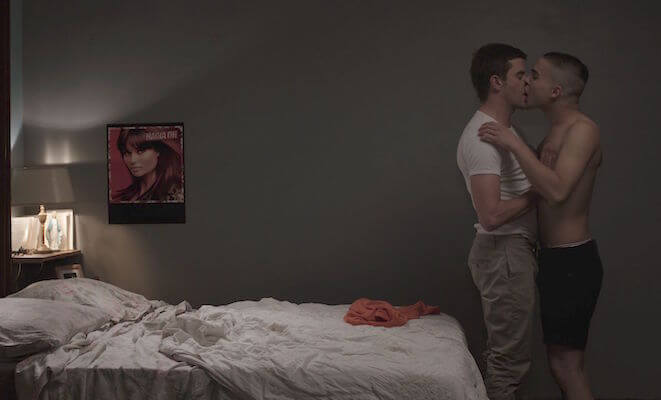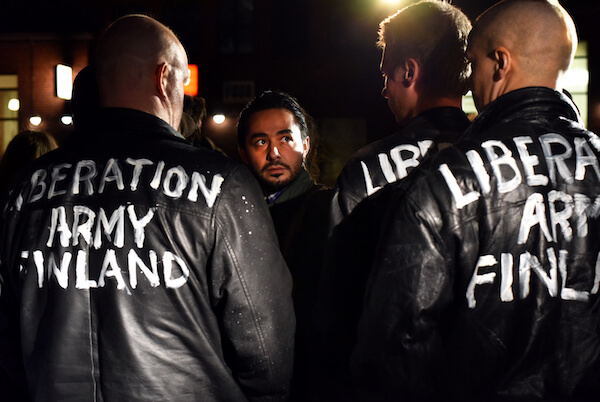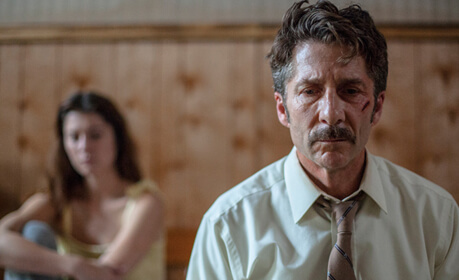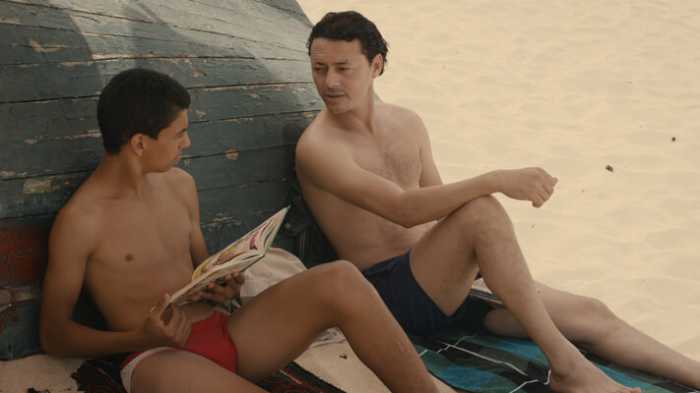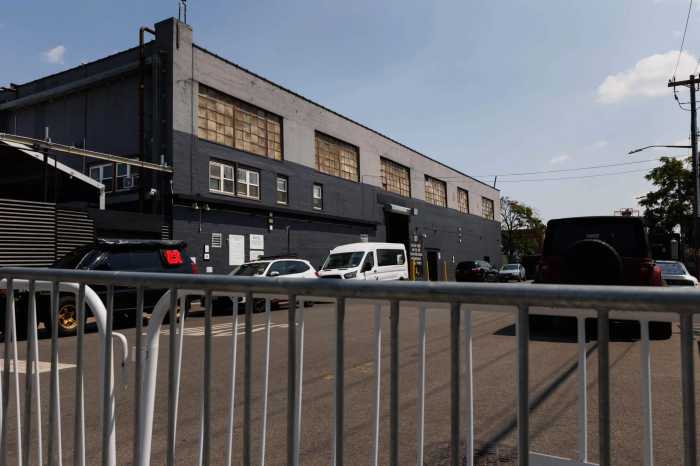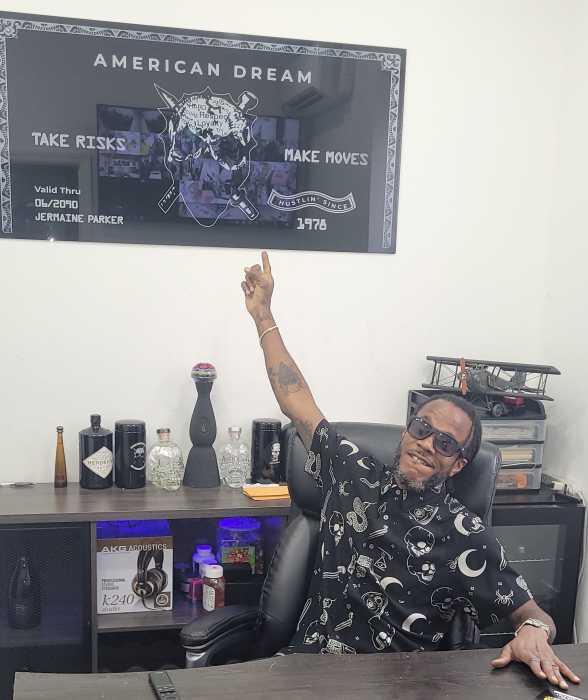Bongile Mantsai and Nakhane Touré in John Trengove’s feature debut “The Wound.” | NEW DIRECTORS/ NEW FILMS
Two queer debut features at this year’s New Directors/ New Films festival showcase exciting new talents in world cinema.
From South Africa comes gay director/ co-writer John Trengove’s remarkable feature debut, “The Wound” (Mar. 25, 1:30 p.m., MoMA Titus 2; Mar. 26, 9:30 p.m., Walter Reade Theater, Lincoln Center).
The film opens in Johannesburg, where Xolani (out gay musician Nakhane Touré) works a factory job. X, as he is known, soon heads out to the mountains in the Eastern Cape of South Africa, where he will be a caregiver for Kwanda (Niza Jay Ncoyini), a “soft” — read queer — initiate in a manhood ritual involving circumcision.
Traditional South African rituals, French road chase highlights of Lincoln Center, MoMA festival
The early scenes have an almost anthropological quality to them that is fascinating (if slightly uncomfortable to watch), providing an intriguing backdrop that sets up themes of masculinity and hierarchy that play out over the course of the film.
As X reconnects with his childhood pal Vija (Bongile Mantsai), another caregiver, the two friends soon head off to a secluded place where they have sex. It is clear from the way that the closeted X looks at Vija that he loves him deeply and longs to be with him. But Vija, who is married and has three children, is not gay.
The observant Kwanda figures out the secret dynamic between X and Vija pretty quickly, and he’s comfortable enough in his own skin to taunt Vija — even though X warns Kwanda to stay away from him, perhaps out of jealousy. X himself is preoccupied with finding ways to be alone and intimate with his part-time lover. A scene of the friends together in a field is fraught with sexual tension; another sequence of them at a waterfall is full of passion.
“The Wound” builds to a powerful (though not entirely unexpected) climax as X must make some difficult decisions and grapple with what it means to be a man in his Xhosa culture.
While the setting is distinctive and specific, “The Wound” is compelling throughout because Trengove makes the story accessible. He deftly captures the shifts in power among the three men as Vija toys with X’s affections and tangles with Kwanda, who is on to Vija’s games. The filmmaker elicits a magnificent performance from Touré who conveys X’s fear and desire through his facial expressions and body language.
“The Wound” is an extraordinary first-time achievement.
French filmmaker Jérôme Reybaud’s “4 Days in France” (Mar. 21, 6:15 p.m., MoMA Titus 2; Mar. 22, 6:15 p.m., Walter Reade Theater, Lincoln Center) opens with Pierre (Pascal Cervo) walking out on his Parisian lover Paul (Arthur Igual) without a word. Getting in his white Alfa Romeo, Pierre lets chance — and Grindr — guide him. He picks up a woman (Fabienne Babe) whose car has broken down. Later, he spends the night with Mattieu (Mathieu Chevé), a handsome and horny 20-year-old, who wants to go to Paris, and gives Pierre a package to deliver to a woman in the countryside.
Paul, meanwhile, is bereft. He rents a car and tries to find Pierre, also utilizing Grindr as well as maps and his instincts.
Reybaud’s intriguing film is alternately serious and absurdly funny as Pierre and Paul encounter the same (or different) people on their parallel journeys. The film is alternately hypnotic and — unfortunately — tedious as the men traverse similar territory in Paul’s hope to reunite with his partner.
Pascal Cervo and Mathieu Chevé in Jérôme Reybaud’s “4 Days in France.” | NEW DIRECTORS/ NEW FILMS
“4 Days in France” is a long (140 minutes), leisurely paced, and low-key chase movie. Reybaud does not reveal much about his characters, and viewers may not care if they even get back together. But it is the journey, not the destination that matters here. The film addresses themes of the past and how decisions we make, either spontaneous or carefully planned, can sometimes have lasting repercussions. Pierre is using his trip to explore his loneliness, and as he meets other characters who are equally isolated or forlorn — such as a thief (Laetitia Dosch) — he forms momentary connections with them.
One particularly memorable encounter Pierre has is with a salesman (Bertrand Nadler) who checks into an adjoining motel room. In exchange for a chance to drive Pierre’s Alfa Romeo, the salesman allows Pierre to kiss him. Later, back at the hotel, the two strangers have an erotic encounter on opposite sides of their shared wall. It is an astonishing sequence that captures the affection each man craves.
Reybaud uses the French countryside to add to the sense of isolation. The lush greenery and mountains are palpable in defining the sense of space the characters experience, as when the salesman shows Pierre his territory from a lookout.
Pierre may have left Paris with no intention of returning, but he is often referred to as “the Parisian” by other characters, emphasizing his outsider status. He does cut a curious figure, never changing his clothes (but occasionally taking them off), and he is often lost, both literally and figuratively, as he wends his way through the countryside. Cervo gives a touching performance in the central role; viewers will feel his every emotional beat.
“4 Days in France” is one of those films where the parts are greater than the whole, but it is a journey still very well worth taking.
NEW DIRECTORS/ NEW FILMS | Film Society of Lincoln Center, 144-165 W. 65th St. | Museum of Modern Art,11 W. 53rd St. | $16; $12 for students & seniors at newdirectors.org

